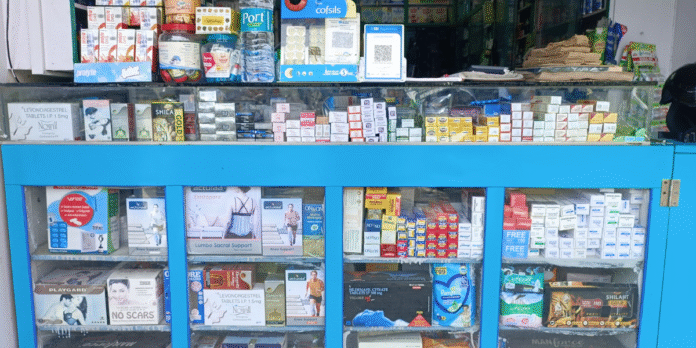Sri Vijaya Puram: A quiet but growing crisis is unfolding across parts of the Andaman Islands, where commonly available prescription drugs are being increasingly misused, particularly by young individuals and low-income workers. A ground investigation by The Wave Andaman reveals that certain pharmacies in Sri Vijaya Puram are dispensing high-risk medications without consistently demanding prescriptions, enabling a pattern of substance misuse that has largely escaped official scrutiny.
While the medications in question are not illegal narcotics, they include potent pharmaceutical drugs with known risks of dependency and misuse. Among the substances reportedly sold with minimal checks are codeine-based cough syrups such as Corex and Phensedyl; anti-anxiety medications including Alprazolam and Diazepam; and painkillers like Tapentadol and Tramadol. Other drugs such as Nitrazepam, Pregabalin, Chlorpheniramine-codeine combinations, and Carisoprodol are also being used inappropriately, according to multiple accounts.
These medications have legitimate medical applications for treating pain, anxiety, and insomnia. However, when consumed without supervision, they can produce euphoric effects and carry the risk of addiction, physical harm, and in some cases, overdose. What has raised concern among healthcare workers and local residents is the apparent ease with which these drugs are being accessed.
“You can see individuals at bus stands early in the morning consuming cough syrups openly,” said a grocery shopkeeper in the Delanipur area. “They appear drowsy, sometimes disoriented. This has become a common sight.”
A pharmacist in Aberdeen Bazaar, speaking on condition of anonymity, acknowledged the challenge. “Technically, we are required to ask for prescriptions. But in practice, some customers are regulars. Refusing sale sometimes leads to conflict, and not all shops want to risk that.”
Medical professionals in Sri Vijaya Puram have reported a rise in health complications associated with prolonged drug misuse. These include liver and kidney damage, psychological dependency, and severe withdrawal symptoms. “We’ve had cases of young patients arriving with confusion, dehydration, and even unconsciousness,” said a general physician at a local clinic. “Often, families bring them in only when the situation has become critical.”
The demographic profile of those affected is broadening. While a significant number are daily wage earners, others include individuals from more stable economic backgrounds. What links many of them, say social workers, is a lack of structured mental health support, employment-related stress, and limited awareness about the risks associated with self-medication.
The regulatory framework under the Drugs and Cosmetics Act and the NDPS Act mandates that such medicines be sold only on prescription. However, enforcement appears inconsistent. Inspections of chemists in smaller towns and markets are reportedly infrequent, and the familiarity between pharmacists and customers often overrides formal procedure.
Compounding the issue is the limited availability of de-addiction and rehabilitation facilities in the Andaman and Nicobar Islands. While government hospitals provide basic support, there are few specialized services for individuals with substance dependency, and social stigma remains a barrier to timely intervention.
Public health experts warn that without stricter oversight, awareness campaigns, and expanded access to mental health and rehabilitation services, the misuse of prescription drugs could escalate into a wider health crisis. For now, the issue continues largely under the radar, raising questions about the adequacy of current safeguards in protecting vulnerable communities.
Authorities have yet to issue a formal response to the findings. However, several doctors and local health workers have called for coordinated action involving pharmacists, enforcement agencies, and civil society organizations to address the problem before it deepens further.





